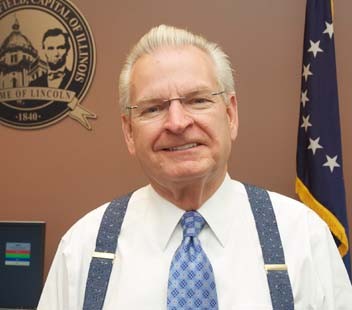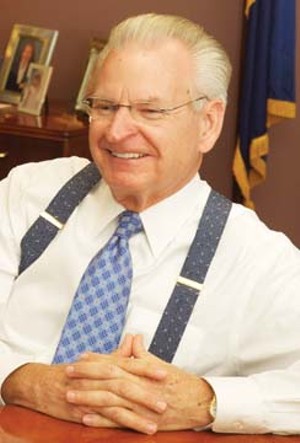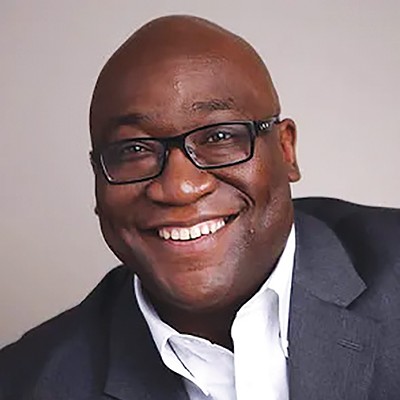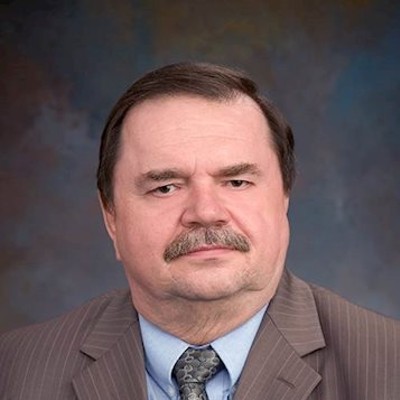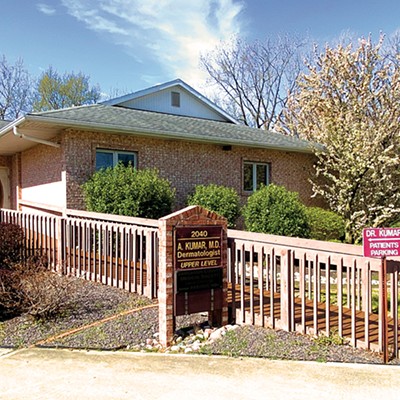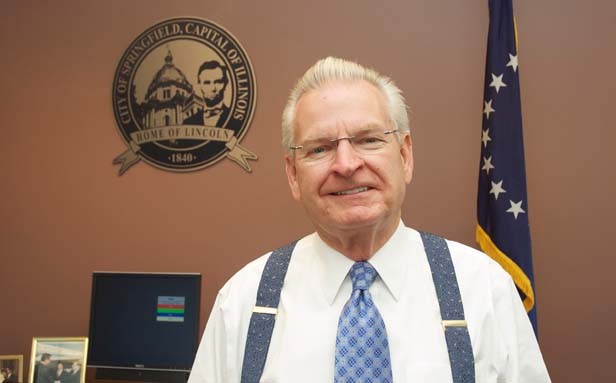
Ward 1 Ald. Frank Edwards, never known for holding his tongue, was just getting warmed up.
“We should set the goals,” the alderman declared two weeks ago as the city council pondered Mayor Mike Houston’s request for $50,000 to conduct a personnel audit aimed at reducing head count at city hall. “We should know what the administration’s goals are. You should lay this out for the aldermen, not just a broad this-is-what-we’re-going-to-do. I really, truly believe we should set the goal. Not we – the mayor. He’s running the show.”
The mayor looks on impassively while Edwards declares that Houston and his staff, not a consultant, should be doing the auditing and deciding who should be fired. After all, the mayor during his campaign declared that there were as many as 50 do-nothing jobs at City Water, Light and Power – the day after his election in April, he said there would soon be a first wave of firings.
Nearly six months later, there have been no mass layoffs, and Houston, who had vowed to do an in-house audit, now wants to hire a consultant. The idea has drawn fire from both aldermen and city treasurer Jim Langfelder, who spoke against the plan, even though the treasurer has no vote in such matters.
“I believe that’s what elected officials are here to do…is to make the tough task and evaluate our departments and make those decisions and save the city’s dollars and make us as efficient as possible,” Langfelder said minutes before the alderman launched his attack.
Edwards accuses Houston of reneging on promises.
“I just don’t like the part, mayor, where you said you were going to do this and now you’re not doing it,” Edwards says. “That doesn’t set well with me.”
“I said I was going to do a personnel audit…” Houston interjects as the alderman continues on, talking over the mayor.
“I think we’re heading down a road where a lot of things are being said, and you’re not following through with the things you’re saying you’re going to do,” says Edwards, tapping the dais with each word for emphasis.
“That’s your opinion,” Houston says evenly. “Further discussion?”
A promise to overhaul the city budget? Nope – after establishing reserve funds for departments, Houston has largely left the budget alone. A plan to fix streets and other crumbling infrastructure without a tax increase? The mayor says he didn’t make that promise to voters. A vow to serve just one term? Houston confirms that he has scheduled a fundraiser, even though Illinois Board of Election records show that he had more than $47,000 in his campaign fund as of June 30.
Houston says he has no plans to run again and that the planned fundraiser is to raise cash for such expenses as buying sponsorships for golf tournaments. But he will not unequivocally rule out a re-election bid.
“At this time, my intent is to serve one term,” Houston says. “I promised my wife that.”
Slower than expected
Houston acknowledges that he has not accomplished as much as he had planned, but says that’s OK.
“As I look at it, I’m happy with the progress that we’re making,” the mayor says. “I think that things have gone slower than I had expected.”
Asked his greatest accomplishment, Houston says that he has turned city hall into a customer-friendly, professional operation.
“It’s when you walk into the building, when you see the people – the way they’re dressed, the way they operate,” the mayor says. “There’s not a formal dress code. But I think you’ll find on the second morning I was on the job there were a lot more people wearing ties than the day before. … I look at myself as a professional manager. What I’m trying to do is actually manage city government.”
Insiders are split about whether Houston is making adequate progress or has fallen behind in carrying out campaign promises.
Ward 8 Ald. Kris Theilen says that Houston deserves a year in office to prove himself.
“I think Mayor Houston still has a game plan,” Theilen says. “I think he’s still headed in the right direction. When we get to the one-year mark, we can decide what we think.”
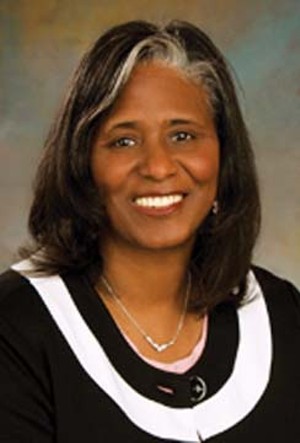
“My concern is, are we managing by consultants or are we managing by leadership?” Edwards says. “If you’re only going to be in there one term, what cover do you need? Go for it, baby.”
Somewhere between Theilen and Edwards sits Ward 3 Ald. Doris Turner.
“I think that he shows a lot of attention to detail, and he really wants to get involved on the nitty-gritty level of what’s going on,” Turner says. “While that’s a good thing on one hand, on the other hand it can tend to slow things down a bit. … I think that it is early. Everybody needs an opportunity.”
Houston blames part of his slower-than-expected start on the fight to move rail lines from Third Street to the 10th Street corridor. It’s an issue he hadn’t expected to be on the forefront, but he says he has spent more time working on railroad relocation than anything else during his time in office.
“From my perspective, it’s probably one of the most important, if not the most important, thing that I have to deal with,” Houston says.
The mayor can’t claim much progress. The state and federal government last spring delayed a study showing that tracks should be moved to 10th Street at a cost of more than $300 million, and U.S. Sen. Richard Durbin has warned several times that there isn’t any federal money to move lines. A federal declaration that 10th Street is the best rail route through the city isn’t likely anytime soon, Houston allows.
“It’s not going to happen without some intensive work to make it happen,” Houston says. “Most importantly, what we need to be able to do is speak with one voice as a community. One of the things the Federal Railroad Administration is attempting to do – and this is my personal opinion – is to divide the community so that there is no single voice so that they can say, ‘Gee, we can sort of do whatever we want to do because the community is not saying where it wants the tracks.’”
The Springfield branch of the National Association for the Advancement of Colored People opposes consolidation on 10th Street, saying that such a plan would put an unfair burden on the east side, but that opposition isn’t uniform. Ward 2 Ald. Gail Simpson, who represents the east side, supports Houston’s rail plan, as does Turner, who appeared alongside the mayor at an August press conference called to blast a federal proposal to shift freight trains from Third to 10th Street and keep passenger trains on Third.
As a candidate, Houston promised to increase minority hiring in the police and fire departments, and he said he is optimistic that the number of minorities will increase in the next class of firefighter recruits.
Rudy Davenport, a founder of the Citizens Club and former president of the Springfield branch of the NAACP, praises the mayor.
“I think he’s doing good,” Davenport says. “I think he has certainly shown that he intends to be fair as far as race is concerned. I haven’t heard any criticism of him with regard to race. That’s very unusual.”
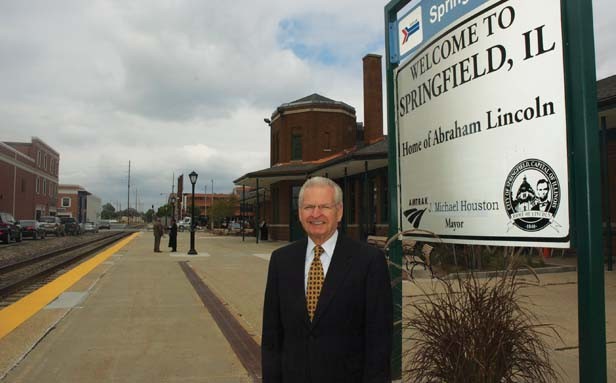
“That was never part of my campaign”
Davenport said that he believes the city supports Houston.
“He came in and won the election and the people have seemed to have gotten behind him – I was quite pleased by that,” Davenport said. “In a short period of time, he has kept stability going, and that’s the main thing to do. We could have expected, I won’t say a breakdown in government, but a slowdown.”
But Houston promised more than stability. Turner and other city council members say they want to see a plan to repair aging streets, sidewalks and sewers – and soon.
“If we don’t see one, it definitely was campaign rhetoric,” says Ward 6 Ald. Cory Jobe. “He said he had a plan.”
Turner says it’s time for the mayor to deliver.
“I am disappointed that I have not seen any movement with regard to an infrastructure plan,” Turner says. “I would have liked to have seen it yesterday. Ward 3 is literally crumbling. … The mayor did say he could do that, and fairly quickly.”
Houston, however, says that he never promised voters an infrastructure plan, but nonetheless is working on one.
“That was never a part of my campaign,” Houston says. “That was an offhand comment that I made to (radio reporter) Jim Leach as a last part of an interview that people then picked up on to say that I had a program. I never said I had a program. I said I had an idea in terms of how we could finance an infrastructure plan. We are still working on that. I think that the plan is, in fact, a viable type of plan and at the right time, making the assumption we can get this put together, we would then present it.”
According to a June 1 story in the State Journal-Register, however, Houston as a candidate did promise an infrastructure plan sooner rather than later.
“On the eve of his election victory, Houston told reporters: ‘I think within a 30-day period, we will be talking about an infrastructure plan for the city of Springfield that is comprehensive, that can be done without raising any taxes or fees,’” wrote reporter Deana Stroisch, adding that the mayor expected to come up with a plan within two months. That was four months ago.
Houston also said the city needed an infrastructure plan in a candidate questionnaire he filled out for the Capital Area Association of Realtors.
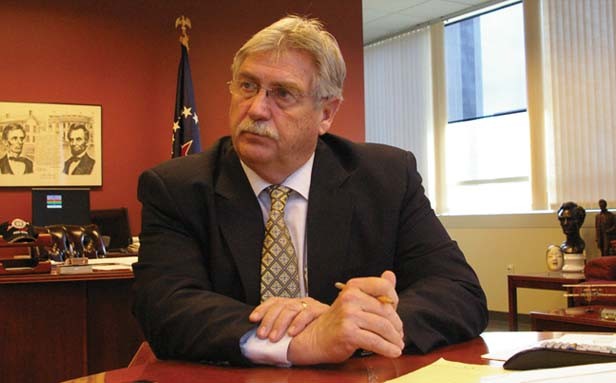
“As chair of the Chamber (of Commerce) board I appeared and addressed the city council in support of the passage of the 0.25 percent increase in the sales tax to be segregated and used only for infrastructure improvements,” Houston wrote. “I have indicated that the city not only needs to maintain what it is currently doing but it needs to develop a comprehensive infrastructure program with a specific source to fund it.”
Frank McNeil, a former alderman who now hosts a radio talk show, says that he isn’t surprised by anything that Houston has, or has not, done.
“As far as I’m concerned, he’s doing great,” McNeil said. “I think that’s what a campaign is: promises. … Public works and infrastructure is going to be a very daunting task. There’s a money issue – a significant money issue.”
Houston offers few specifics, nor will he commit to a timeline.
“Like anything else, it’s not an uncomplicated type of plan, so one of the things I have to do is work out the details of it,” the mayor says. “Second, I have to work out the timing of it. And then I have to be in a position to go out and present it to the community as to why this would be something that they should do.”
Edwards isn’t impressed.
“I heard through the grapevine he has no plan,” the alderman says.
Impatience with nuisance properties
Houston and at least four aldermen were elected last spring on platforms that included stronger action against nuisance properties and irresponsible landlords.
On that issue, at least, Turner says that she has no patience.
“That’s one regard where I think things are moving slowly,” Turner says. “I am not prepared to wait a year.”
Jobe, too, says that the city needs to move. In August, he had predicted that a nuisance-properties ordinance would be ready for council consideration by mid-September. Now, the goal is early this month.
“If we’re still talking about abandoned properties a year from now, I’m not doing my job as an inner-city alderman, and neither is the mayor,” said Jobe, who gives the mayor a B for his performance so far. “I will say it’s a generous B. It’s too early. If we haven’t seen an infrastructure plan and a way to finance it by next summer, I’ll begin to question his leadership ability.”
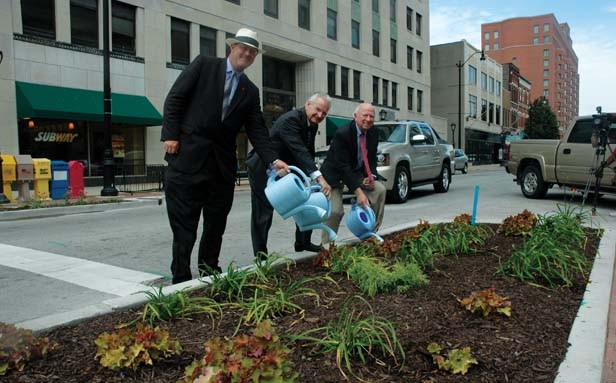
Citing a recent crackdown on building violations at MacArthur Park apartments and his hiring of two attorneys this summer to work on code enforcement issues, Houston says that he is making progress.
“I talked about the fact that we’re going to take our core, inner-city neighborhoods back, one abandoned building at a time, and that’s exactly what we are going to do,” Houston said. “And it’s not just a matter that they’re going to do some repairs and we’re going to go away. … We are going to stay on this.”
Overall, however, Houston says that he is in no rush.
“I ran for office with the idea that we are going to do certain things,” Houston says. “I didn’t say I was going to do them overnight. I didn’t say I was going to do them within five months, and anyone who expected me to do them overnight or do them within five months is being unrealistic.”
Houston smiles at the suggestion that city hall is an aircraft carrier.
“It’s pretty hard, if you think about putting an aircraft carrier in Lake Springfield and turning it around – that’s a pretty apt description,” the mayor says. “That doesn’t mean it can’t happen.”
Changes at city hall
Nine people are sitting in a city hall conference room, waiting to see Houston, who has opened his office once a month so that anyone can talk to the mayor, first come, first served. They started showing up nearly an hour before the scheduled 5:30 p.m. start time.
They are here for all sorts of reasons. John Crisp, president of the Harriet Tubman/Susan B. Anthony Women’s Self Help Center, wants help finding space for his group that helps kids and women, which is being forced out of a building on South Grand Avenue. Mark Kessler, owner of Recycled Records, thinks that downtown merchants should have a greater say in organizing the annual Route 66 Mother Road Festival. Margaret Collins wants the city to restore branch libraries and expand library hours at the main branch.
This is the second time that Crisp has come to meet-the-mayor night at city hall. He came away empty-handed during the last meeting in July.
“He was talking about how the city’s in trouble,” Crisp said. “He wanted to get on his feet – maybe a little later on or something.”
For Crisp, tonight is a little later on. As he waits for a 10-minute audience, he says the mayor appears to be doing a good job, although it is early.
“I admire him for being brave enough to try running Springfield at all,” Crisp says.
Crisp came out of the meeting with no assurances.
“He listened,” Crisp says. “He didn’t say yay or nay either way.”
Collins says that she didn’t vote for Houston, but she praises the mayor for hiring a consultant to evaluate personnel – Springfield is so rife with politics that a third party is needed, she says, and she fears lawsuits if the process isn’t done properly. The city needed stability after former Mayor Tim Davlin committed suicide last December, she adds.
“I think he’s doing a good job,” Collins said. “I think we were at a period of unstableness – we were at a period of distress. For some reason, we trust him and we expect him to do the right thing. I think he has brought about a certain amount of healing in this community.”
Collins didn’t get branch libraries reopened, but within two weeks of her meeting with Houston, Sunday hours were restored at the downtown main library, a goal that Houston set in May.
“In Margaret’s case, I was very upfront with her: We can’t afford to have branch libraries,” Houston says a few days later.
But closing the main branch on Sundays, once the library’s busiest day of the week, didn’t make sense, Houston says.
“Realizing that was the case, we needed to provide some additional hours,” the mayor says. “I think that also sent a message that we are going to make changes and do things differently.”
Houston cites his replacing Robert “Barry” Helmerichs with Ken Fustin as fire chief as another example of breaking with the old. Helmerichs remains with the department as a deputy chief.
“When I came into office in the city of Springfield, a fire chief had never been demoted,” Houston says. “I think that sent a message that change was taking place and we’re not simply going to do things because that’s the way we have always done things. It really is a matter of looking at city government and saying how can we do things more efficiently.”
Contact Bruce Rushton at [email protected].

